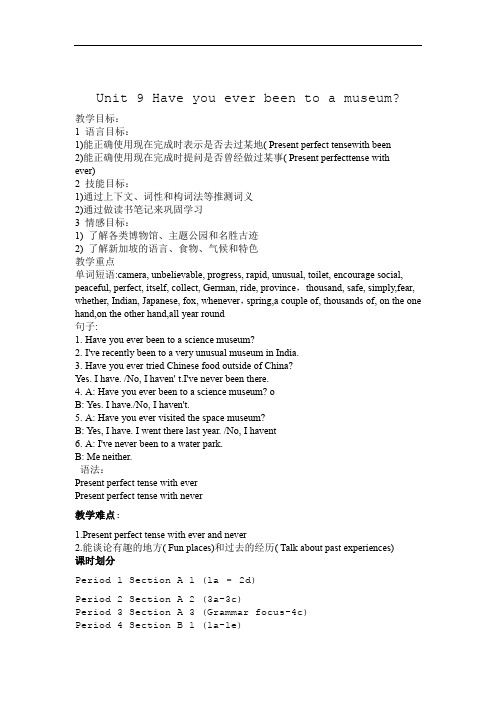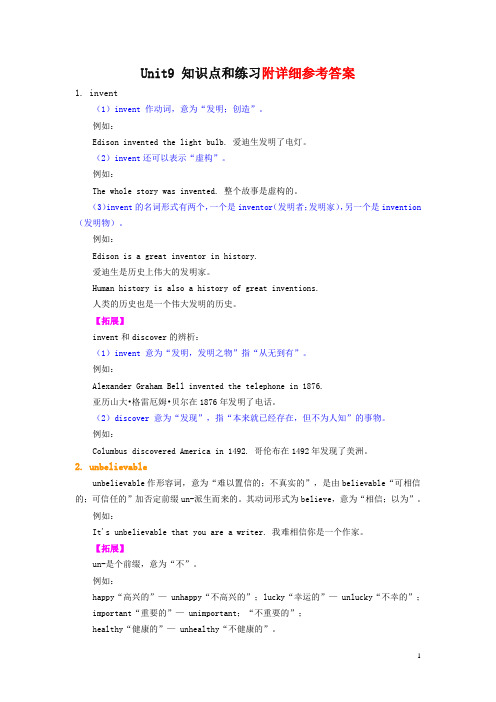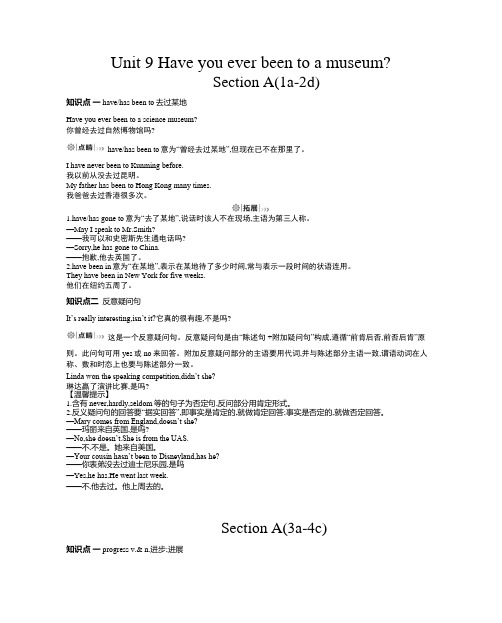人教新目标版初二英语下学期Unit 9 Have you ever been to a museum 单元检测卷(含答案)
八年级英语下册_Unit_9_Have_you_ever_been_to_a_museum复习题(无答案)(新版)人教新目标版

Unit 9 have you ever been to a museum?复习题I.重点词组默写1.科学博物馆___________________________2.游乐场________________________________3.去某个不同的地方 _____________________4.乘地铁 _______________________________5.玩得高兴,过得愉快____________________6.去滑冰 _______________________________7.导致,引导 ___________________________8.搭起帐篷 _____________________________9.以如此快的方式 _______________________10.下象棋 _______________________________11.许多不同种类的…______________________12.鼓励某人做某事 _______________________13.泡一杯茶 _____________________________14.像…一样享受 _________________________15.几次 _________________________________16.特别的主题____________________________17.在公园里走动__________________________18.一次乘舟行程 _________________________19.搭乘;兜风 _________________________20.举行派对,聚会________________________(单数 have a party)21.做笔记 _______________________________22.成千上万的,许许多多的 _______________23.度假 _________________________________24.一方面…,另一方面…______________________________________25.四分之三______________________________26.一个讲英语的国家______________________27.做某事有困难__________________________28.似乎很奇怪____________________________29.最佳时间做某事________________________30.在一个自然环境中 _____________________31.全年,整年 ____________________________32.接近,靠近,在附近 ____________________33.在白天 ________________________________34.在东南亚_______________________________35.介意做某事 ____________________________II. Grammar Focus 默写1.你曾经去过科学博物馆吗?______ you_____ ______ to a science museum?是的,我曾经去过自然博物馆。
初中英语人教新目标版(2012)八年级下册Unit 9 Have you ever been to

Unit 9 Have you ever been to a museum?教学目标:1 语言目标:1)能正确使用现在完成时表示是否去过某地( Present perfect tensewith been2)能正确使用现在完成时提问是否曾经做过某事( Present perfecttense with ever)2 技能目标:1)通过上下文、词性和构词法等推测词义2)通过做读书笔记来巩固学习3 情感目标:1)了解各类博物馆、主题公园和名胜古迹2)了解新加坡的语言、食物、气候和特色教学重点单词短语:camera, unbelievable, progress, rapid, unusual, toilet, encourage social, peaceful, perfect, itself, collect, German, ride, province,thousand, safe, simply,fear, whether, Indian, Japanese, fox, whenever,spring,a couple of, thousands of, on the one hand,on the other hand,all year round句子:1.Have you ever been to a science museum?2.I've recently been to a very unusual museum in India.3.Have you ever tried Chinese food outside of China?Yes. I have. /No, I haven' t.I've never been there.4.A: Have you ever been to a science museum? oB: Yes. I have./No, I haven't.5.A: Have you ever visited the space museum?B: Yes, I have. I went there last year. /No, I havent6.A: I've never been to a water park.B: Me neither.语法:Present perfect tense with everPresent perfect tense with never教学难点:1.Present perfect tense with ever and never2.能谈论有趣的地方( Fun places)和过去的经历( Talk about past experiences)课时划分Period 1 Section A 1 (1a – 2d)Period 2 Section A 2 (3a-3c)Period 3 Section A 3 (Grammar focus-4c)Period 4 Section B 1 (1a-1e)Period 5 Section B 2 (2a-2e)Period 6 Section B 3 (3a-Self check)Period 1 Section A 1 (1a-2d)教学目标1. Knowledge and Ability Objects(1) Key vocabulary: amusement; neither(2) Listening practice.(3) Target language:1.Lets' go somewhere different today.2.Have you ever been to…? Yes, I have./ No, I haven't.3.How about/what about…?4.How are we going to get there?5.We can take the subway/…(4) To train students' listening and speaking skills.2. Method Objects in Teaching(1) Scene teaching method.(2) Listening and speaking methods.(3) Pair work.3. Sensibility and ValueTo be interested in taking part in all kinds of activities in English class.Teaching Key Points1. Key vocabulary in this period.2. Target language in this period.Teaching DifficultyMake conversations freely using the target language.教学过程Teaching Procedures课前三分钟:中国共产党党史党的一大:中国共产党诞生1921年,中国共产党在上海召开第一次全国代表大会,宣告了中国共产党的成立。
人教版新目标英语八年级下册:Unit 9《Have you ever been to museum》 讲解+练习题目+答案

Unit9 知识点和练习附详细参考答案1. invent(1)invent 作动词,意为“发明;创造”。
例如:Edison invented the light bulb. 爱迪生发明了电灯。
(2)invent还可以表示“虚构”。
例如:The whole story was invented. 整个故事是虚构的。
(3)invent的名词形式有两个,一个是inventor(发明者;发明家),另一个是invention (发明物)。
例如:Edison is a great inventor in history.爱迪生是历史上伟大的发明家。
Human history is also a history of great inventions.人类的历史也是一个伟大发明的历史。
【拓展】invent和discover的辨析:(1)invent 意为“发明,发明之物”指“从无到有”。
例如:Alexander Graham Bell invented the telephone in 1876.亚历山大•格雷厄姆•贝尔在1876年发明了电话。
(2)discover 意为“发现”,指“本来就已经存在,但不为人知”的事物。
例如:Columbus discovered America in 1492. 哥伦布在1492年发现了美洲。
2. unbelievableunbelievable作形容词,意为“难以置信的;不真实的”,是由believable“可相信的;可信任的”加否定前缀un-派生而来的。
其动词形式为believe,意为“相信;以为”。
例如:It's unbelievable that you are a writer. 我难相信你是一个作家。
【拓展】un-是个前缀,意为“不”。
例如:happy“高兴的”— unhappy“不高兴的”;lucky“幸运的”— unlucky“不幸的”;important“重要的”— unimportant;“不重要的”;healthy“健康的”— unhealthy“不健康的”。
人教新目标英语八年级下册讲义—Unit 9 Have you ever been to a ……

新目标八年级下册Unit 9 Have you ever been to a museum ?讲义一、重点单词1. amusement n. 娱乐; 游戏2. somewhere adv. 在某处; 到某处3. camera n. 照相机; 摄影机; 摄像机4. invention n. 发明物5. invent v. 发明; 创造1. unbelievable adj. 难以置信的; 不真实的2. progress n. 进步; 进展3. rapid adj. 迅速的; 快速的4. unusual adj. 特别的; 不寻常的5. toilet n. 坐便器; 厕所6. encourage v. 鼓励7. social adj. 社会的8. peaceful adj. 和平的; 安宁的9. performance n. 表演; 演出10. perfect adj. 完美的; 完全的11. itself pron.(it的反身代词) 它自己12. collect v. 收集; 采集13. German adj. 德国的; 德语的; 德国人的n. 德语; 德国人14. theme n. 主题15. ride n. 供乘骑的游乐设施; 短途旅程16. province n. 省份17. simply adv. 仅仅; 只; 不过18. fear v. & n. 害怕; 惧怕19. whether conj. 不管......;还是); 或者......(或者); 是否20. Indian adj.印度的 n. 印度人21. Japanese adj.;日本的; 日本人的; 日语的n. 日本人; 日语22. equator n. 赤道23. whenever conj. 在任何......时候; 无论何时24. spring n. 春天25. mostly adv. 主要地; 通常26. location n. 地点; 位置二、短语归纳1.at night在夜晚2.in a more natural environment在一个更加自然的环境中3.all year round 全年4.be far from 离……远5.in the dark 在黑暗中6.in the past 在过去7.have been to sp. 去过某地8.science museum 科学博物馆9.history museum 历史博物馆10.amusement park 游乐园11.go somewhere different 去不同的地方12.go skating 去滑冰13.take the subway 坐地铁14.a great way to spend a Saturday afternoon一个过周六下午的好方法15.all the old movie cameras所有的古老的电影摄影机16.learn about sth.解有关……的情况17.on the weekend 在周末18.camp in the mountains 在大山里露营19.put up a tent搭帐篷20.in such a rapid way 以如此迅猛的方式21.different kinds of各种各样的22.development of toilets 厕所的发展23.social groups 社会团体24.the tea art performances茶艺表演25.make a perfect cup of tea with beautiful tea sets用漂亮的茶具沏一杯完美的茶26.a nice place to enjoy tea 一个品茶的好地方27.thousands of 数以千计的28.International Museum of Toilets国际厕所博物馆29.the Terracotta Army 兵马俑30.Southeast Asia东南亚31.Night Safari 夜间动物园32.three quarters 四分之三33.an English-speaking country一个讲英语的国家34.have problem doing sth. 做某事很困难35.during the daytime在白天36.a couple of times 好几次37.right now 现在;目前38.an amusement park with a special theme一个有特别的主题的游乐园39.walk around the park 在公园里到处走40.hear of 听说41.take a ride兜风42.another province另一个省43.the Bird’s Nest鸟巢44.encourage sb. to do sth.鼓励某人做某事45.on the one hand... on the other hand.一方面,另一方面三、句型集萃1.a great way to do sth一个做某事的好办法2.It’s unbelievable that很难相信……3.watch sb do sth.看某人做了某事4.encourage sb to do sth鼓励某人做某事5.as..as和。
新课标人教版八年级英语下册Unit 9 Have you ever been to an amuse

—So did Tina.
中国地图
蒂娜也去了。
—He has been a soldier for two years.
要点点拨
他已经当了两年兵了。
go inline skating 滑旱冰
—So have I.
我也是。
全析提示
3.Look at the map of the town.Listen and circle the places 助动词 have 和 has 可以与前面的
you hear.
主语缩略’ve 和’s。
看城镇的地图。听录音并圈出你听到的地方。
如:we’ve,they’ve,he’s,
water world 水上世界
it’s 等。
city library 城市图书馆
have not 常缩略为 haven’t,has
fun times amusement park
如果说“欢迎回家”该怎么说呢?
把 1a 中你的回答和你搭档的回答对照一下。
Wele back home!
4.For me,“I have to!” is number two.
对我来说“I have to!”是第二位的。
要点点拨
5.Listen to a teacher interview a student.Circle the newsletter 业务通讯;新闻信札
route“路线、小路、小巷”,使
The main attraction was a Charlie Chaplin film.
用 X 围也较小。course 表示船的
吸引人的主要是查理·卓别林的电影。
“航道”或飞机的“航线”。
The idea of being a teacher has little attraction to young
新课标人教版八年级英语下册Unit 9 Have You Ever Been to an Amuse

Unit 9 Have You Ever Been to an Amusement Park?一、学习目标:1.掌握现在完成时的用法;2.了解一般过去时、现在完成时和现在完成进行时的意义的区别;3.能够准确使用多种时态谈论自己的经历。
二、学习重点难点:1. 现在完成时由主语+have/has+过去分词构成。
其主要用法如下:I.在未指明具体时间的情况下,现在完成时动词通常可以表示在说话之前已经完成,而后果或影响至今仍存在的动作。
例如:The concert has started. 音乐会已经开始。
I have had breakfast. 我已吃过早饭。
注意:have gone to 和have been to 在意义上有区别。
例如:He has gone to Hong Kong. 他到某某去了。
(他已前往某某,或在途中,或已到达。
说话人暗示他现在不在现场。
)He has been to Hong Kong. 他曾到过某某。
(说话人认为他过去到过某某,现在已不在该地。
言外之意他对某某有所了解。
)II. 现在完成时动词可以表示开始于过去持续到现在(也许还会继续进行下去)的动作或状态。
例如:1) I have studied English since last year. 我从去年开始学习英语。
2) She has lived in Beijing for five years. 她住在已经五年了。
注意:e, go , leave, arrive, buy, lose, receive, join, die, bury 和marry 等动词所表示的动作是一时的,不能延续的,故不能与for …,since …等开头的表示一段时间的状语连用。
不过,这些词用于否定句则可以与表示持续的时间状语连用,即动作的不发生是可以持续的。
例如:不能说:*He has e to Beijing for two years.*He has bought that book for three weeks.*He has joined the Army for one and a half years.*His grandma has died for nine months.* I have received his letter for a month.可以说:He has been in Beijing for two years.He has had that book for three weeks.He has been in the army for one and a half years.His grandma has been dead for nine months.I haven't received his letter for almost a month.或者:It is two years since he came to Beijing.It is three weeks since he bought that book.It is one and a half years since he joined the Army.It is nine months since his grandma died.2. 现在完成时把过去的动作和现在的结果联系起来,一般过去时只限于表示过去的动作本身,与现在的结果无关。
2014春人教新目标八下unit9_have_you_ever_been_to_a_museum__Section_A_3

你曾经去过科学博物馆吗?
Have you ever been to a science museum?
是的,我去过科学博物馆。/不,我从未去过科学 博物馆。
Yes, I’ve been to a science museum./ No, I’ve never been to a science museum.
构成:have(助动词) + p.p has(第三人称单数助动词) + p.p
疑问式
回答
Have I/you finished the work? Has he/she finished the work?
Yes, you/I have. No, you/I haven’t. Yes, he/she has. No, he/she பைடு நூலகம்asn’t.
have not 常缩略为 haven’t。 has not 常缩略为 hasn’t。
Have you had your 表示过去发生或已 lunch yet? 经完成的动作对现
Yes, I have. I have 不饿了)
在造成的影响或结
just had it. (现在我 果。
I have already taught him some English. John has never been to the space museum. My boy has just started junior high school.
I. 根据括号内的要求完成下列各句,每 空一词(含缩写)。 1. My parents have come back already. (改为否定句) My parents _______ haven’t ______ come back ____. yet 2. The boys have been to Japan lots of times. (改为一般疑问句) _______ Have the boys _______ been to Japan lots of times?
人教新目标版初中英语八年级下册Unit9Haveyoueverbeentoamuseum要点讲解

Unit 9 Have you ever been to a museum?Section A(1a-2d)知识点一have/has been to去过某地Have you ever been to a science museum?你曾经去过自然博物馆吗?have/has been to意为“曾经去过某地”,但现在已不在那里了。
I have never been to Kunming before.我以前从没去过昆明。
My father has been to Hong Kong many times.我爸爸去过香港很多次。
1.have/has gone to意为“去了某地”,说话时该人不在现场,主语为第三人称。
—May I speak to Mr.Smith?——我可以和史密斯先生通电话吗?—Sorry,he has gone to China.——抱歉,他去英国了。
2.have been in意为“在某地”,表示在某地待了多少时间,常与表示一段时间的状语连用。
They have been in New York for five weeks.他们在纽约五周了。
知识点二反意疑问句It’s really interesting,isn’t it?它真的很有趣,不是吗?这是一个反意疑问句。
反意疑问句是由“陈述句 +附加疑问句”构成,遵循“前肯后否,前否后肯”原则。
此问句可用yes或no来回答。
附加反意疑问部分的主语要用代词,并与陈述部分主语一致,谓语动词在人称、数和时态上也要与陈述部分一致。
Linda won the speaking competition,didn’t she?琳达赢了演讲比赛,是吗?【温馨提示】1.含有never,hardly,seldom等的句子为否定句,反问部分用肯定形式。
2.反义疑问句的回答要“据实回答”,即事实是肯定的,就做肯定回答;事实是否定的,就做否定回答。
—Mary comes from England,doesn’t she?——玛丽来自英国,是吗?—No,she doesn’t.She is from the UAS.——不,不是。
- 1、下载文档前请自行甄别文档内容的完整性,平台不提供额外的编辑、内容补充、找答案等附加服务。
- 2、"仅部分预览"的文档,不可在线预览部分如存在完整性等问题,可反馈申请退款(可完整预览的文档不适用该条件!)。
- 3、如文档侵犯您的权益,请联系客服反馈,我们会尽快为您处理(人工客服工作时间:9:00-18:30)。
Unit 9 Have you ever been to a museum?单元检测卷听力部分(20分)一、听力(本题有15小题,第一、二节每小题1分,第三节每小题2分;共计20分) 第一节:听小对话,回答问题。
()1.What's wrong with Tony?A.Having a stomachache. B.Having a toothache.C.Having a sore throat.()2.Whose basketball is it?A.Bob's. B.Paul's. C.Jane's.()3.What's the girl's advice?A.Call him up. B.Go to his house. C.Write him a letter.()4.Where are the speakers talking?A.In a clothes store. B.In a bookstore. C.In a restaurant.()5.What was Sally doing yesterday morning?A.Watering some trees. B.Doing some washing.C.Planting some trees.第二节:听长对话,回答问题。
听下面一段较长的对话,回答6—7两小题。
()6.How many ice-creams has she had today?A.3.B.4.C.5.()7.How long has she had this habit?A.Three months.B.Three years.C.Four years.听下面一段较长的对话,回答8—10三小题。
()8.What's the loser's name?A.Sandra.B.Sally.C.Sandy.()9.When did she lose the watch?A.On her way to work.B.In the morning.C.On her way back from work.()11.When did Liu Wei lose his both arms?A.At the age of 10. B.At the age of 12. C.At the age of 15.()12.What did he love when he was a child?A.Music. B.Sports. C.Books.()13.How did he learn to play the piano after the accident?A.Learned from his teacher. B.Learned by himself.C.Learned with his friends.()14.How long did he practice the piano every day?A.For six hours. B.For seven hours. C.For ten hours.()15.Why could he win China'sGotTalent?A.Because his teacher was great.B.Because he had stronger feet.C.Because he kept practicing and never gave up.笔试部分(80分)二、完形填空(本题有15小题,每小题1分;共计15分)I have been to many places. But Kunyu Mountain is the most __16__ place in my mind. I have been to the top of the mountain and I think of it as big __17__ in my life.Do you know the __18__ of Kunyu Mountain? It is in the city of Yantai, Shandong Province. Every year __19__ of tourists come to visit it. My dad and I went to climb it in an early summer five years ago. The top was surrounded(围绕) by many white clouds. I __20__ to look up while climbing at first. I didn't think it was __21__ enough to climb such a high mountain. __22__ it was beautiful, I was in no mood(心情) to look at it. My legs were badly shivering(颤抖) because of the 3-hour walk. I __23__ myself that I couldn't give up climbing because it was my dream to __24__ the top.It was cold and the wind was brushing my face strongly. It was __25__ that I succeeded in reaching the top __26__ the help of my dad at last. Seeing the mountains with large rocks around me and the waterfalls below us, I __27__ my success in reaching the top. I couldn't help taking out my __28__ to take some beautiful pictures right away.In our lives, the top is our __29__. The climbing is difficult but worth your efforts(值得努力).Just prepare more so that you can __30__ reach the top.()16.A.boring B.unusual C.strange D.social()17.A.progress B.performance C.theme D.invention()18.A.weather B.population C.birth D.location()19.A.a thousand B.thousandC.thousands D.a thousands()20.A.feared B.hurried C.cheated D.provided()21.A.brave B.fair C.safe D.perfect()22.A.Because B.Although C.So D.If()23.A.encouraged B.chose C.allowed D.finished()24.A.see B.get C.reach D.climb()25.A.easy B.modernC.nervous D.unbelievable()26.A.with B.without C.by D.in()27.A.owned B.achieved C.enjoyed D.accepted()28.A.camera B.invention C.tool D.umbrella()29.A.job B.study C.dream D.rule()30.A.never B.finally C.hardly D.neither三、阅读理解(本题有15小题,第31—35小题每小题1分,第36—45小题每小题2分;共计25分)AYears ago, if a teenager had some problems in his life, he might write them in his diary. Now he might get on the Internet and write them in his blog(博客). In many ways, a diary and a blog are almost the same. Then, what makes a blog different from a diary?The biggest difference is that a blog is much more public than a diary. Anyone can read what you write in your blog. Usually, a teenager likes hiding his diary book and treats it as a secret. If you are not satisfied with a friend and write something bad about him in your diary, he will never know it. However, if you do this on the Internet, that friend may read your blog and get angry. So we have to be careful of what we write.A blog has good points, of course. People choose to write in blogs. They know that their friends will read what they write. If you feel sad one day and write in your diary, no one will know about it. If you write the same words in your blog, your friends may quickly write back to comfort you and offer their help. Blogs help people know what their friends are doing.Though it's a good way to write blogs about everyday life, I still prefer my old diary.()31.Now when a teenager has some problems in his life, he might________.A.talk to his friends B.keep them in his diaryC.write them in his blog D.keep them in secret()32.________ is NOT mentioned in the passage.A.Chatting on QQB.Getting on the InternetC.Writing blogsD.The difference between a diary and a blog()33.The underlined word “comfort”means “________” in Chinese.A.责怪 B.安慰C.嘲笑 D.贬低()34.From the passage we know that ________.A.the writer thinks a blog is more helpful than a diaryB.the writer thinks a blog and a diary are the sameC.the writer likes a diary better than a blogD.the writer likes a blog better than a diary()35.The passage mainly talks about________.A.teenagers' problems in their livesB.the difference between a diary and a blogC.the good points of writing blogsD.the good points of writing diariesBIn a cold winter, a couple had to move out of their big house because of bankruptcy(破产). The husband worked day and night but with no care of his wife. So the wife thought, “He doesn't love me any more. He just thinks about his work.”One day, she wanted to take a shower, but her husband stopped her at the door. “Let me takeit first, OK?”“Why not let me take it first?” she asked. “I'm tired, dear. You take it later, OK?” She was very sad.On a rainy day, she found nothing to do and turned on his computer. After a few minutes, her eyes were full of tears... it was his diary:Today, I was quite sad. She asked me why I was always taking the shower first, and I said I was tired. She was unhappy. I wasn't as rich as before! We moved to the small house and it was very cold. I found that if one person took the shower first, the bathroom could get a little warmer. So I always rushed to the bathroom first. When she took the shower, the bathroom could get warmer, at least 1°C. I can't give her more, but at least I can give her 1°C love.()36.The couple moved out of their house ________.A.on a rainy dayB.in a cold winterC.when the husband lost his workD.when the wife saw her husband's diary()37.The woman thought her husband didn't love her because ________.A.he didn't buy her beautiful clothesB.he didn't have enough moneyC.he always worked with no care of herD.he had another woman()38.The woman's eyes were full of tears because ________.A.she felt sad by her husband's wordsB.the rainy day made her sadC.her eyes were hurt by the computerD.she was moved by her husband's diary()39.The man wanted to take the shower first because ________.A.he was tired and wanted to sleep earlierB.he wanted to make the bathroom warmerC.he wasn't as strong as beforeD.he couldn't stand the cold winter()40.From the passage, we know that ________.A.the man loved his wife very muchB.the woman didn't love her husband any moreC.the man was very poor beforeD.the woman had no jobCParents can be very important teachers in our lives. However, they are not always the best teachers. Parents may be too close to their children emotionally(感情上). Sometimes they can only see their children through the eyes of a protector. For example, a teacher might see a trip to a big city as a valuable experience. However, it might seem too dangerous to a parent.Another problem is that parents may expect their children's interests to be similar to their own. If they love science, they may try to force(强迫) their children to love science, too. But what if(要是……又怎样) their child's true love is art, or writing, or car repair?Parents usually want to pass__on their values to their children. But should children always believe what their parents do? When children are young, they believe that their parents are always right. But when they get older, they will have different ways of thinking. The most important thing to realize is that we all have many teachers in our lives. Our parents teach us, our teachers teach us, and our friends teach us. Books, newspapers and televisions also teach us. All of them are valuable.()41.________ might see a trip to a big city as a valuable experience, according to the passage.A.A parent B.A teacherC.Either a teacher or a parent D.Neither a teacher nor a parent()42.Parents may hope that their children have the same ________ as their own, according to the passage.A.looks B.interestsC.habits D.jobs in the future()43.The underlined phrase “pass on”in the 3rd paragraph means “________”in Chinese.A.路过 B.继承C.传递D.领悟()44.When children get older, they ________.A.don't believe their parents any moreB.should always believe what their parents doC.believe that their parents are always rightD.begin to have their own ways of thinking()45.What is the best title for the passage?A.Never grow up!B.Believe Your Parents ForeverC.Are parents always the best teachers?D.How many teachers can we have in our lives?四、词汇运用(本题有15小题,每小题1分;共计15分)A)用方框中所给词的适当形式填空。
